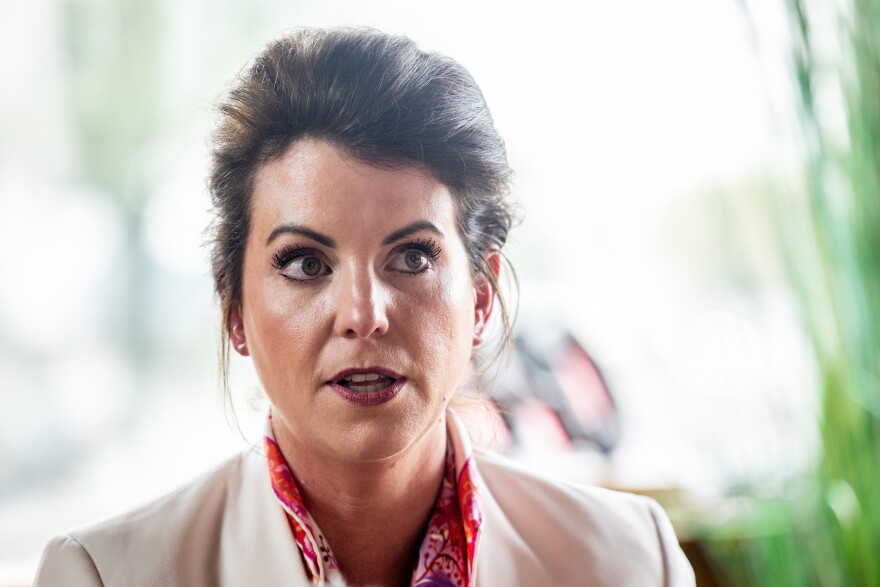Austin’s slowly shrinking vision for a fast-moving urban rail system by the end of the decade is about to face a new challenge, one that could upend the voter-approved transit expansion: property tax warriors in the Texas Legislature.
New bills challenging the Austin Transit Partnership's (ATP) powers to borrow money come as the organization is about to unveil a set of scaled-back light-rail options that fit within the original $7.1 billion Project Connect budget.
Rail opponents are seizing on the moment, accusing Austin leaders of having oversold their plan to get it passed by voters in 2020 and calling on the Republican-dominated state Legislature to throw a wrench in the gears.
"This town got bamboozled," said Gerald Daugherty, a former Travis County commissioner who has spent decades fighting Austin's light-rail initiatives, including the most recent one that increased city property taxes by 20%. "The lege has to step up and do the right thing."

The proposals — House Bill 3899 and Senate Bill 1791 — would force the ATP to hold a citywide election before borrowing large amounts of money to pay for the expensive upfront costs of building the light-rail system. ATP estimates it would need to borrow up to $2.5 billion and plans to repay the money with its existing stream of tax revenue.
Supporters of the bills say if Texas cities and counties have to hold elections before borrowing money and paying the debt back with property taxes, then the Austin Transit Partnership should have to hold bond elections, too.
"The intention is simply to require that they follow all of the transparency requirements that are already in state law for any other taxing entity," said Republican state Rep. Ellen Troxclair, a former Austin City Council member who wrote the House bill. "They've kind of found a loophole and are exploiting it."

Proponents of the transit expansion scoffed at the legislation, saying voters already authorized borrowing when they approved the Project Connect ballot proposition by a margin of 16.5% in an election with more than 420,000 votes.
"People knew there would be bond debt associated with financing and then delivering Project Connect," said Casey Burack, an executive vice president at ATP who oversees business and legal affairs. "That was all set forward in a very transparent manner leading up to the vote."
Using debt to finance construction costs was a core component of Project Connect. As explained in public documents and at open government meetings, creating a dedicated stream of property tax revenue not only would help ATP fund pay-as-you-go engineering and construction costs, but also cover payments on borrowed money.
Voters were asked on the ballot if they wanted to create an independent board that would be "providing funds for loans and grants to develop or expand transportation within the city."
Requiring an election to authorize ATP borrowing could raise questions among the bureaucrats at the Federal Transit Administration doling out billions in highly competitive grants. Project Connect is premised on the federal government paying for up to half the project.
"That's really the risk of this legislation and we are already getting questions from the federal government," Burack said. "What does this mean for ATP's ability to fund the construction years?"
If voters were to deny ATP the ability to borrow, Austin's light-rail ambitions could be entirely derailed — unless someone can come up with an inventive way to pay for more than $1 billion in annual construction costs for multiple years in a row.

Austin Mayor Kirk Watson, a former Democratic state senator, said he believes there may be a deal to be cut with state Sen. Paul Bettencourt, the Republican lawmaker who's made lowering property taxes a focus of his legislative career. Bettencourt is carrying the ATP bill in the Texas Senate.
"If transparency and accountability and not killing the project are really the goals, I think we might be able to come up with ways that are good to make sure there's transparency and accountability," Watson said. "But we should not, we cannot work to deny the result of an election and overturn the voice of the people of Austin."

Meanwhile, the ATP is preparing to present a set of less expensive light-rail options during an open house Tuesday at the Austin Central Library from 4 p.m. to 7 p.m.
A briefing sheet reviewed by KUT provides a high-level overview of five light-rail alternatives covering less distance than the initial plan pitched to voters ahead of the 2020 vote. Each of five options is estimated to cost less than $5 billion, Burack said.
Only one of the five options appears to include the downtown transit subway promised to voters. But instead of a 4-mile tunnel going down Fourth Street, under Lady Bird Lake and up South Congress Avenue, this tunnel would run about a mile down Guadalupe Street from East Martin Luther King Jr. Boulevard to Eighth Street. Only one station would be underground.

Last year's plan to extend the subway tunnel was the single biggest cause of cost overruns. Increasing the length from 1.56 to 4.19 miles doubled the estimated price tag to more than $4 billion.
All light-rail options to be presented by the ATP raise the possibility of installing elevated sections through significant parts of the downtown area, a less expensive option than tunneling that still frees trains from having to stop at traffic lights.
ATP says the plans in the briefing document viewed by KUT could change before they're presented to the public next week.
But officials are quick to emphasize that these scaled-back plans are just a starter system. The ATP will eventually be able to build the map now estimated at over $10 billion, as long as the Project Connect financial model isn't upended.
"We'll build as much as we can," Burack said. "As soon as we've paid some of that debt off so we have a higher cash flow, we will start going and building the next phase."













